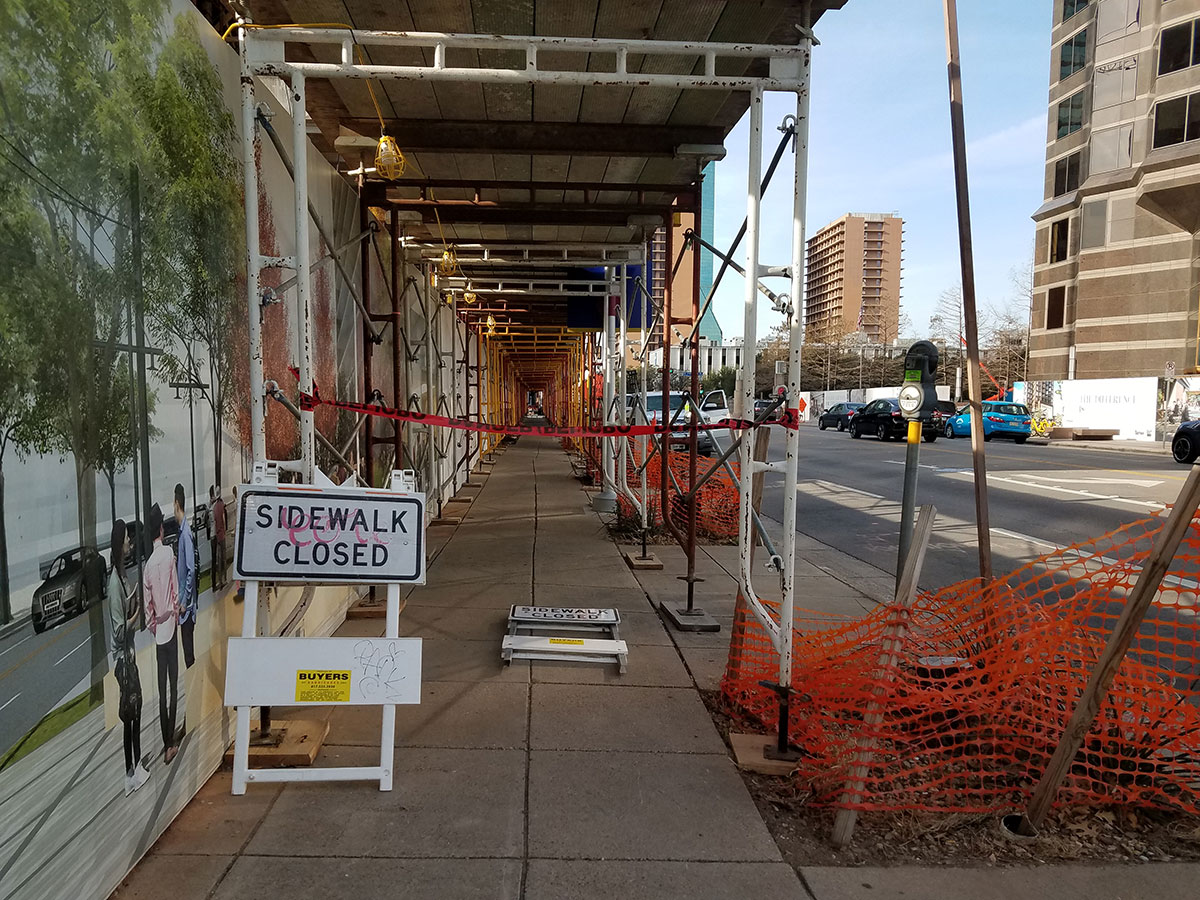For almost a year now, we have been chronicling in this space the various maladies—many of them construction-related—impeding pedestrian life in Dallas. There have been several egregious middle fingers pointed by developers toward walkers. There have been sidewalks that inexplicably turn into parking spots or run you smack-dab into a utility. There has been scaffolding constructed—only to be closed off. There have been crosswalk buttons set in cacti minefields. It’s all right here.
Wednesday, praise be, we got closer to bringing these problems into containment, as the City Council was briefed on tweaks to the city’s handling of Right of Way (which we will abbreviate to “ROW” from here on) issues. One of those tweaks, a simple increase in oversight, is in place already: city staff says that from August through November, Public Works issued 137 citations for ROW violations. Those were given out by just four public works employees, but in 2019, the city will have a total of 11 staffers with the ability to write tickets.
The recommendation from staff moving forward is to amend city code to require temporary walkways or scaffolding when there is not “active work” occurring on the actual sidewalk, such as concrete being poured or work on utilities. If it’s unavoidable, the city will require a pedestrian detour. Interim Public Works Director Robert Perez pointed to another instance in which developers would be allowed to put up a detour rather than scaffolding or an alternative walkway—that is, if they’re working dozens of floors up and concerned about things falling onto the sidewalk. It’s an odd exception considering the scaffolding options that exist to protect against such debris.
Here’s hoping that the city doesn’t get too liberal with these exceptions, because although requiring a detour may sound nice, a recent example near us boiled down to an arrow telling walkers to cross the middle of the street to the other side. Not exactly the solutions walkers crave.
There are other ROW-related proposals here outside the scope of pedestrian access. The city wants to be better about publicity, notifying citizens and businesses located near upcoming construction not just two days before it starts via door hangers—as the policy currently dictates—but an additional 10 days prior to the start date. On that point, Southern Dallas Council member Tennell Atkins called for better oversight of contractors tasked with that notification.
Other pieces of the staff proposal include instituting a 24-hour deadline for removing traffic barricades following the completion of a project; establishing work hours for building construction as 7 a.m. to 7 p.m. so as to cut down on noise complaints; and using a scoring matrix to evaluate the success of public projects with regard to, among other things, the contractor’s concern for and protection of the public. The evaluations, then, could help determine how work is awarded going forward.
All in all, the changes were met without much pushback from council. Sandy Greyson, Council member for North Dallas, pointed out that handing someone a citation for causing a nuisance after the fact, particularly with regard to something that caused traffic to back up, might not be much of a real-time answer to the problem. But Perez assured her that staff has people frequently crawling downtown and uptown, as well as responding to complaints within an average of 10 to 15 minutes.
North Dallas Council member Lee Kleinman, the chair of the council’s Mobility Solutions, Infrastructure, and Sustainability Committee, pushed for city staff to make changes to the city’s ROW policy. (He also invited our Matt Goodman to make a committee presentation about our Dallas Hates Pedestrians series, to which Matt declined for editorial reasons.) He suggested that the scoring matrices be fed into Dallas’ open data portal, for transparency sake. That would be nice. He also called the staff’s proposal a “proactive” and “forward-thinking” approach, and he suggested that contractors who keep citizens in mind should be rewarded with extra points in their evaluations. The goal is to be able to accommodate development without constant daily disruption.
“We’ve got to be very conscientious of the impact it has on our citizens,” he said.





